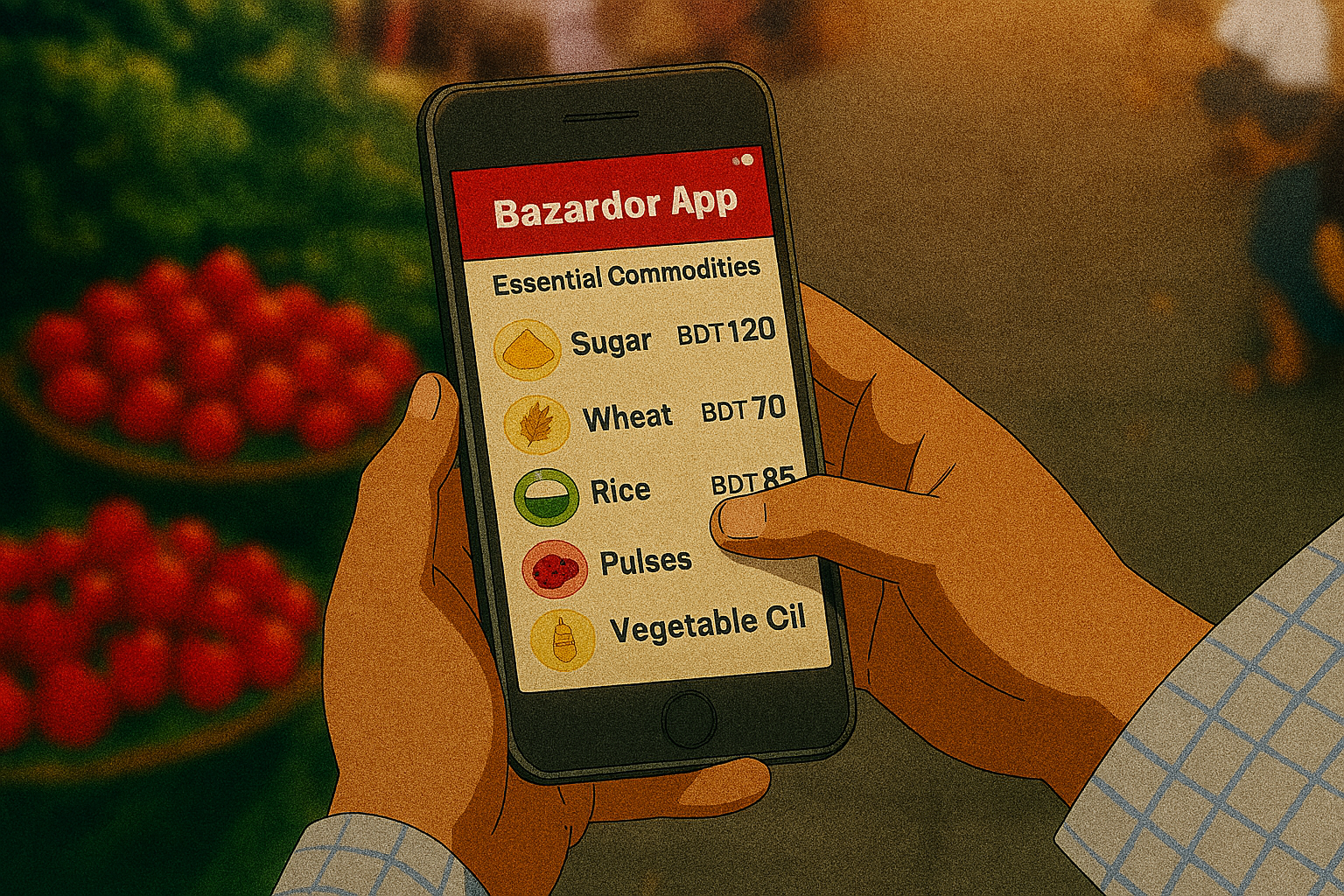Bazardor App: A Digital Solution for Daily Market Prices in Bangladesh

What is the Bazardor App?
The Bazardor app stands out as a unique initiative to ensure price transparency in local markets. Launched by the Directorate of National Consumer Rights Protection (DNCRP), this mobile application has quickly gained attention for offering district-wise commodity prices directly to consumers.
The Bazardor app is designed to provide up-to-date prices of essential commodities. By using the app, consumers can check the official prices of products in markets across all 64 districts of Bangladesh. The initiative was launched in 2025 with the aim of minimizing price manipulation and strengthening consumer protection.
Developed with technical support from Daffodil Institute of IT, the app was released free of cost to the DNCRP. It reflects the government’s commitment to empowering citizens with digital tools that improve market transparency and safeguard their rights.
In recent years, digital technology has transformed the way people shop, communicate, and access information. Bangladesh has also embraced this digital shift, especially in areas related to consumer rights and fair trade.
This article explores the features, benefits, and future prospects of the Bazardor app, highlighting how it is reshaping consumer awareness and contributing to market stability across the country.
Key Features of the Bazardor App
The Bazardor app comes with several practical features that make it user-friendly and highly functional:
- District-wise Market Prices: Consumers can view retail prices of essential goods in different markets across Bangladesh, ensuring access to localized information.
- Daily Updates: Prices are refreshed on a daily basis to reflect changes in the market, allowing users to stay informed in real time.
- Offline Access: Even without internet connectivity, the app retains previously loaded data, enabling users to check prices at any time.
- Simple Interface: The app is designed to be lightweight and easy to use, catering to both tech-savvy individuals and first-time smartphone users.
- Free of Cost: Anyone can download and use the Bazardor app without paying any subscription or hidden charges.
Why the Bazardor App Matters for Consumers
Price manipulation has long been a concern for Bangladeshi consumers, especially when it comes to essential goods such as rice, oil, vegetables, and meat. Traders often charge higher prices depending on demand, seasonality, or sudden supply shortages. This lack of consistency creates distrust and makes consumers vulnerable.
The Bazardor app addresses this issue by offering reliable, government-verified price information. As a result:
Consumers can compare actual market prices with official listings before making purchases.
Unfair practices by dishonest traders can be challenged more effectively.
Market competition becomes healthier as pricing becomes transparent.
Ultimately, the app strengthens consumer confidence and promotes accountability in trade practices.
The Role of the DNCRP in Launching the App
The Directorate of National Consumer Rights Protection (DNCRP) plays a crucial role in monitoring markets, preventing fraud, and ensuring fairness in trade. By launching the Bazardor app, DNCRP has expanded its services into the digital sphere.
Officials now have a platform that not only informs consumers but also creates a database of real-time pricing trends. This allows them to identify discrepancies more efficiently and take corrective measures when necessary. The initiative is aligned with Bangladesh’s broader vision of a “Smart Bangladesh,” where technology enhances public services and governance.
Limitations and Challenges
Like any new digital initiative, the Bazardor app also faces challenges:
Timeliness of Updates: Since prices fluctuate quickly in physical markets, keeping the app completely synchronized can be difficult.
User Adoption: Many consumers, particularly in rural areas, may still be unfamiliar with smartphone apps.
Expanded Features: At present, the app primarily provides price updates. Future versions could integrate features such as complaint filing, GPS-based location tracking, and live reporting of overpricing.
Despite these hurdles, the app has already set an important foundation for consumer-centric digital services in Bangladesh.
User Feedback and Reception
Early user reviews of the Bazardor app highlight its convenience and potential. Many appreciate the transparency it provides, while others suggest additional features for greater utility. For example, some users want the ability to submit photos or videos when filing complaints about price violations. Others recommend automatic location detection so that the app can instantly show nearby market prices.
This feedback shows that while the app has been well-received, there is room for continuous improvement.
Future Prospects of the Bazardor App
The long-term success of the Bazardor app will depend on how effectively it adapts to consumer needs. Potential future developments include:
Integration with E-commerce Platforms: Linking the app with digital marketplaces could allow consumers to compare prices before making online purchases.
Collaboration with Local Authorities: Union councils and municipal bodies could use the data to regulate markets more efficiently.
Consumer Engagement Campaigns: Public awareness campaigns can encourage more citizens to download and regularly use the app.
Expansion of Product Categories: Beyond essential goods, the app could eventually include services and other consumer products.
With these improvements, the Bazardor app has the potential to become a cornerstone of consumer rights protection in Bangladesh.
The Bazardor app is more than just a price-tracking tool; it is a step toward greater transparency, accountability, and fairness in Bangladesh’s markets. By putting verified price information into the hands of ordinary consumers, it empowers them to make smarter decisions and protect themselves from unfair practices.
As digital adoption continues to rise, the Bazardor app represents a successful example of how technology can serve public interest. With further updates and broader public engagement, this app could redefine the relationship between consumers, traders, and regulatory authorities in Bangladesh.







